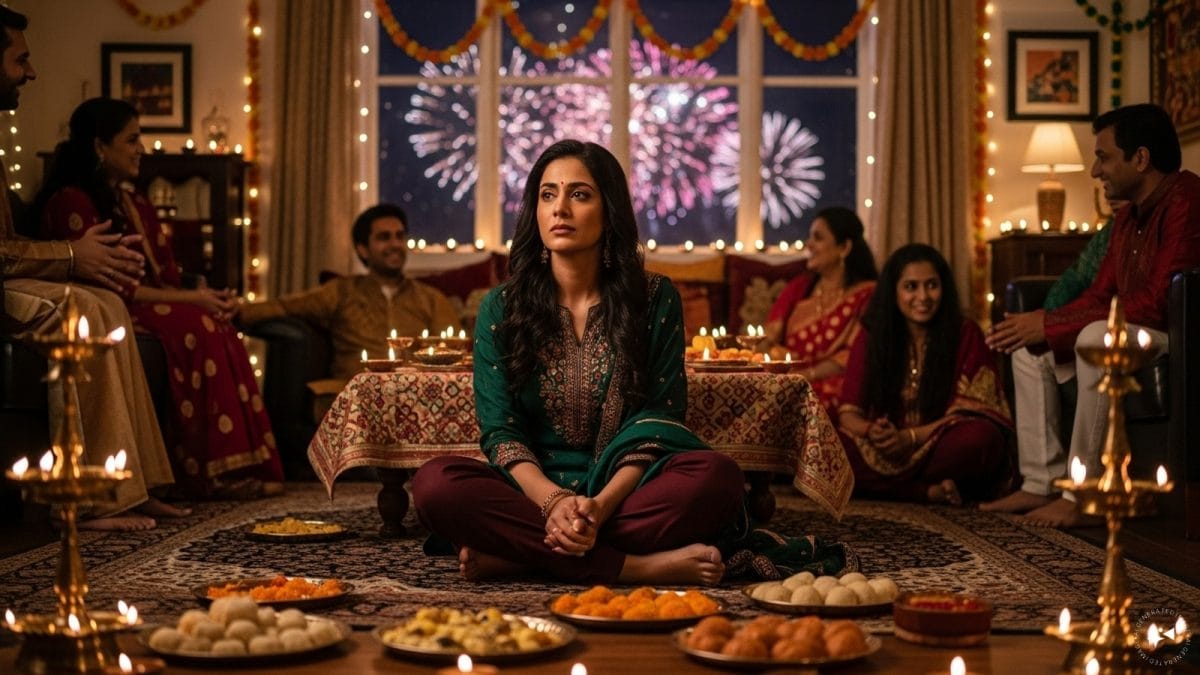Last Updated:
Festivals can lift spirits but trigger stress too. From financial strain to social pressure let’s understand the unseen side of festival celebrations affecting mental health

When celebrations feel heavy: the unseen side of festivals and mental health (Representational)
Festivals are meant to be joyful- they promise connection, colour, and celebration. In India, where festivals such as Diwali, Durga Puja, and Christmas stretch across nearly four months, the expectation to be joyful often collides with emotional fatigue, financial strain, and social comparison. Simply put, the lights, sweets, and gatherings can cast long shadows for those already struggling with loneliness or loss.
Research increasingly shows that for many, the festive season brings more anxiety than comfort. A 2014 report by the National Alliance on Mental Illness (NAMI) found that 64% of people living with mental health conditions experienced worsening symptoms during the holidays. Another survey by the American Psychological Association (APA) revealed that 38% of adults reported heightened stress during festive periods.
This piece explores what research tells us about how festivals shape mental health, why some people experience the “pressure to feel happy,” and what we can do to make celebrations more inclusive and emotionally sustainable.
Why Do Festivals Affect Mental Health Differently For Everyone?
Festivals are built on connection. They are social anchors that create shared memories and reinforce belonging. Anthropological studies, such as those by Émile Durkheim and later psychologists like Barbara Fredrickson, show that collective rituals can foster “emotional synchrony”, the sense of shared joy and meaning that bonds communities.
However, these same social mechanisms can become exclusionary. People who feel disconnected because of grief, relocation, or strained family ties — often experience amplified loneliness when surrounded by visible celebration. A 2021 Lancet Psychiatry commentary on social isolation noted that feelings of exclusion are more pronounced when positive social cues (like festivities) are in abundance.
In India, the cultural expectation to participate in every ritual and gathering can make opting out seem antisocial. This perceived pressure to appear happy or grateful can worsen emotional distress, especially for those with underlying depression or anxiety.
Can Cultural Expectations Intensify Stress and Anxiety During Festivals?
Yes. Social norms play a powerful role in how individuals experience festivals. A 2023 National Institute of Mental Health and Neurosciences (NIMHANS) report highlighted that around 30 per cent of urban Indians experience increased stress during festive months due to social obligations and financial expectations.
In a country where hospitality and gift-giving are expressions of care, individuals often stretch their emotional and financial limits to meet perceived standards. Psychologists describe this as “performative happiness”, the act of displaying joy even when one feels emotionally drained.
This social performance is further magnified by social media. Platforms like Instagram and WhatsApp now function as digital spaces of comparison. Research from Stanford University’s Social Media Lab (2022) found that curated depictions of celebrations contribute to “affective dissonance”, a mismatch between how people feel and what they are expected to show.
How Does Grief Or Loss Impact Festive Mental Health?
Festivals can act as emotional mirrors. For those who have lost loved ones, these occasions often heighten feelings of absence and nostalgia. Studies in The Journal of Affective Disorders (2019) observed that anniversaries and celebrations act as “temporal triggers” for grief, leading to spikes in anxiety, sadness, and sleep disturbances.
In India, where festivals are traditionally family-centric, those grieving or living away from family often find the celebrations emotionally taxing. The constant exposure to cheerful imagery and togetherness can deepen the sense of isolation.
Psychologists note that many of his patients report “feeling guilty for not being able to enjoy the celebrations.” This guilt adds another emotional layer to the grieving process, making recovery more complex.
Do Financial Pressures And Social Inequality Worsen Festive Stress?
Absolutely. Money remains a major driver of holiday stress. According to a 2023 ICICI Lombard Consumer Survey, 46 per cent of respondents in Indian metros reported financial anxiety during festive months, primarily linked to spending on gifts, travel, and social events.
The cultural emphasis on generosity and display gifting, new clothes, home décor can be particularly difficult for middle- or lower-income households. Economic inequality becomes more visible during festivals, intensifying feelings of inadequacy.
Experts say this “financial performativity” creates a feedback loop- individuals spend beyond their means to meet expectations, leading to post-festival debt and guilt. Financial stress, in turn, correlates with anxiety and reduced life satisfaction, as highlighted in a 2022 World Bank brief on mental well-being and consumer behaviour in emerging economies.
How Do Gender Roles Influence The Mental Load During Festivals?
Festivals are not experienced equally across genders. Sociological research by Tata Institute of Social Sciences (TISS) in 2020 found that Indian women spend up to 70 per cent more time on unpaid domestic labour during festive months. This includes cooking, cleaning, hosting, and managing family rituals often without acknowledgment.
This invisible emotional and physical labour adds to what psychologists call the “mental load”, the cognitive effort required to manage household and emotional needs simultaneously. The result is exhaustion, irritability, and burnout, especially among working women.
For men, the pressure may manifest differently. Financial responsibility and social expectations of being providers can create heightened stress, particularly in economic downturns. Both genders, therefore, experience distinct but overlapping mental health pressures tied to festive norms.
What About Overstimulation And Substance Use During Celebrations?
Noise, crowding, and constant social activity can overwhelm even emotionally healthy individuals. A study published in Environmental Health Perspectives (2021) linked prolonged exposure to festive noise pollution (above 85 decibels) with elevated cortisol levels and disrupted sleep patterns. These physiological stressors can aggravate mental health symptoms in individuals prone to anxiety.
Festivals also tend to normalise excessive eating and drinking. The Indian Journal of Psychiatry (2020) noted a 25% spike in substance misuse cases reported during major festivals. Alcohol and nicotine, used as coping tools, may provide temporary relief but contribute to long-term dependence and mood instability.
How Can Individuals Protect Their Mental Health During Festivals?
Experts recommend a combination of self-awareness, boundary-setting, and mindfulness. The APA’s 2023 Holiday Stress Report advises people to “acknowledge rather than suppress negative emotions,” emphasising that authenticity reduces stress.
Practical strategies include:
- Acknowledging feelings that it is acceptable to feel sad, tired, or unenthusiastic during celebrations. Acceptance helps prevent emotional burnout.
- Set realistic expectations and avoid overcommitting to events or social obligations to prioritise rest and balance.
- Mindful consumption helps limit exposure to social media and noise-heavy environments.
- Financial planning prepares a budgets early to avoid impulsive spending.
- Seek connection, if away from family, consider volunteering, joining local community events, or connecting virtually with loved ones.
Reframing festivals as periods of reflection rather than performance. By doing so, individuals can engage more meaningfully without the emotional burden of perfection.
Can Workplaces Play A Role In Mental Health-Friendly Celebrations?
Yes, collective responsibility can reduce individual pressure. Workplaces can help by normalising mental health days during festive months, creating inclusive celebrations, and avoiding mandatory participation in social events.
Communities can foster “psychological safety” by recognising that not everyone celebrates in the same way. Mental health professionals also advocate for “quiet spaces” or “low-sensory zones” during large public events, especially for individuals with sensory sensitivities or anxiety.
Festivals were designed to connect us, not deplete us. Yet, as expectations grow and celebrations become more performative, mental well-being often takes a back seat.
October 21, 2025, 08:00 IST
Stay Ahead, Read Faster
Scan the QR code to download the News18 app and enjoy a seamless news experience anytime, anywhere.







